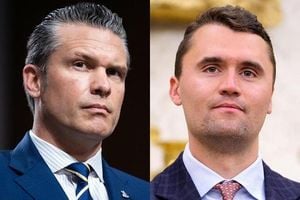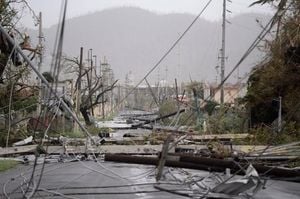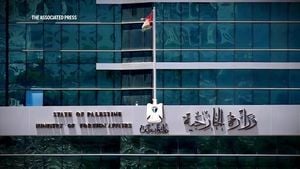President Donald Trump’s recent moves to deploy the National Guard in response to violent crime have thrust Chicago and Washington, D.C. into the national spotlight, igniting fierce debate over policing, civil liberties, and the future of public safety in America’s cities. On August 26, 2025, Trump threatened to send National Guard troops to Chicago—America’s third-largest city—citing what he called a “killing field” and claiming residents were “screaming for us to come.” This threat followed his declaration of a crime emergency in Washington, D.C. earlier in the month after a government staffer was assaulted, a decision that has already cost the capital an estimated one million dollars per day, according to Reason.com.
Trump’s rhetoric is nothing new. He has repeatedly singled out Chicago on the campaign trail, calling it a “hell hole,” comparing it to war zones, and vowing to “send in the feds” as far back as 2017. But his latest threats come at a time when, according to city data reported by the Associated Press, Chicago is experiencing its steepest decline in violent crime in over a decade. Shootings are down 37%, homicides have dropped by 32%, and total violent crime has fallen by more than 22% in the first half of 2025. “The empirical data is very clear that the Chicago trend is extremely positive,” said John Roman, director of the Center on Public Safety and Justice at the University of Chicago. “Chicago is doing better than the rest of the country on a lot of really important measures.”
Still, the numbers don’t tell the whole story. Chicago saw about 570 homicides in 2024, and while the overall trend is downward, certain neighborhoods remain plagued by persistent gun violence, particularly during the warmer months. The lethality of shootings—that is, the rate at which victims die from their wounds—has increased, as has the recovery of high-capacity magazines at crime scenes, according to the University of Chicago Crime Lab. The city’s homicide rates can vary dramatically block by block, with some neighborhoods experiencing up to 68 times more homicides than others.
Trump’s threats have stirred a mix of fear, frustration, and defiance among Chicagoans. Many residents and community leaders have pushed back, arguing that federal troops—who lack training in de-escalating violence and understanding the nuances of local neighborhoods—would only heighten tensions and undo years of progress. “It’s a direct affront to the progress our communities have made,” said Bradly Johnson, who leads BUILD Chicago, an anti-violence group focused on the city’s West Side. “It’s not a war zone. They’re vibrant, resilient communities where young people deserve opportunities and not intimidation.”
Illinois Governor JB Pritzker, a potential 2028 presidential contender, convened roughly 100 elected officials, pastors, business leaders, and activists on August 25, 2025, to oppose the deployment of federal troops. The show of unity, set against the backdrop of Chicago’s gleaming skyscrapers, included U.S. Senator Dick Durbin and the Rev. Michael Pfleger, a well-known Catholic priest. Pfleger called for resources to be directed toward violence prevention, saying, “Take the wasted money in sending the National Guard and the wasted money used on threatening commercials by your Homeland Security secretary and use it on real violence and prevention programs that will bring peace.”
Ordinary Chicagoans echoed these concerns. Art Jarrett, a business owner just south of downtown, pointed to Trump’s own business interests in the city, quipping, “He can’t think it’s that big a killing field; he wouldn’t have built a building here.” Pastor Donovan Price, an advocate for gun crime victims, argued that Trump “unequivocally does not know what they’re talking about” regarding crime in Chicago, warning that federal troops could disrupt hard-won progress. “When things are finally starting to turn around, you have someone come up with something totally unnecessary that could perhaps change the tide,” Price said. “He’s trying to strike the hope out of the hearts of good people in our city.”
Community leaders stress that Chicago’s progress stems from addressing the systemic drivers of violence, not militarized crackdowns. Kimberley Smith, director of national programs for the University of Chicago Crime Lab, praised the city as “a hub for innovation in gun violence prevention” and called for more federal investment in research-based strategies. Jahmal Cole, founder of My Block, My Hood, My City, insisted, “As for Trump’s remarks, it’s worth remembering that rhetoric alone doesn’t improve public safety. We need smart, community-focused investments, not sensationalism.”
Meanwhile, the situation in Washington, D.C. provides a cautionary tale. The city had the fourth-highest murder rate in the U.S. in 2024 and nearly 1,000 carjackings in 2023—a staggering 650% increase since 2017, as noted by Reason.com. Despite the National Guard deployment, “there has so far been little noticeable difference across most of the city, for better or worse.” Trump has described the D.C. operation as “a sort of test” for similar interventions in cities like Baltimore and Chicago.
Legal experts and commentators have weighed in on the constitutional implications. The Posse Comitatus Act prohibits the use of the Army, Navy, Marine Corps, and Air and Space Forces in domestic law enforcement, but the National Guard—when federalized—operates under a different set of rules. The Supreme Court’s decision in Perpich v. Department of Defense affirmed that a federalized Guard can enforce federal law, provided Congress authorizes it. While Trump’s earlier deployment of Marines in Los Angeles likely crossed legal boundaries, penalties under the act are rare and unlikely to apply after the Supreme Court’s recent ruling granting presidents presumptive immunity for official acts.
Some critics draw historical parallels, warning of the dangers of transforming the National Guard into a de facto standing army. The Founders, wary of standing armies wielded against citizens, instead emphasized the importance of militias drawn from the people. Turning the Guard into a permanent federal police force, they argue, would undermine the very freedoms it was created to protect. The author of the Reason.com article, reflecting on both American and Canadian experiences, cautioned, “Establishing a nationwide infrastructure of military policing is a dangerous play and ought to be weighed against the considerable risks such a program would pose.”
Canada’s recent experience with federal policing during the 2022 trucker protests offers a sobering comparison. The government’s crackdown, including the suspension of civil liberties and the freezing of protestors’ bank accounts, was later found illegal by a Canadian court. Yet, as the Reason.com piece notes, Canada’s approach has not made the country safer—rural areas policed by the RCMP often face higher levels of severe crime, and the bail system has enabled repeat offenses. The lesson, critics say, is that more policing or militarization is not a panacea for public safety.
In Chicago, many hope to chart a different course—one that builds on community resilience, innovation, and targeted investment rather than military intervention. As Sydney Aldrich, a 26-year-old resident, put it, “We have a lot of community members around town that are supportive of one another, and we watch out for each other.”
The debate over federal intervention in local policing is far from settled, but as America’s cities grapple with the twin challenges of crime and civil liberties, the choices made in the months ahead will reverberate far beyond Chicago’s city limits.




